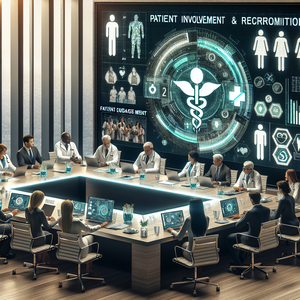Bridging the Gap: Health Informatics and Patient Engagement

Historically, healthcare operated on a provider-centric model, where patients had limited involvement in their health management. However, there is a significant shift toward patient-centric care, which encourages patients to take an active role in their health decisions. Health informatics is a catalyst for this transition, offering tools and resources that promote patient involvement. One of the most impactful tools is the electronic health record (EHR). EHRs allow patients to access their own medical histories, lab results, and treatment plans conveniently. This transparency instills trust and motivates patients to engage in meaningful discussions about their health alongside their healthcare providers. For example, a study published in the Journal of Medical Internet Research found that patients who accessed their EHRs reported feeling more informed and empowered to manage their health conditions.
Digital Tools Enhancing Engagement
Health informatics encompasses a variety of digital tools designed to improve patient engagement. Patient portals, mobile health applications, and telehealth services are prime examples of how technology can bridge the communication gap between patients and providers.
Patient Portals
Patient portals allow individuals to schedule appointments, request prescription refills, and securely communicate with their healthcare teams. This accessibility not only saves time but also empowers patients to take charge of their health. Research conducted by the American Journal of Managed Care indicates that patients who utilize patient portals show higher levels of satisfaction and engagement in their care.
Mobile Health Applications
Mobile health applications offer tailored resources to meet patients' specific needs. Applications that track medication adherence help patients manage their treatment regimens, while symptom-checker tools enable individuals to assess their health conditions before seeking professional help. A study by the Health Affairs journal revealed that patients using mobile health applications reported increased adherence to treatment plans and a better understanding of their health conditions.
Telehealth Services
Telehealth services, which gained significant traction during the COVID-19 pandemic, have also proven essential in enhancing patient engagement. By allowing patients to consult with their doctors remotely, healthcare providers ensured continuity of care while reducing the fear of exposure to the virus. According to a survey by the Pew Research Center, nearly 76% of patients expressed satisfaction with telehealth visits, highlighting its role in encouraging patient engagement.
Improving Communication with Data Analytics
Effective communication is crucial for fostering patient engagement, and health informatics enhances this aspect through data analytics. By analyzing patient data, healthcare providers can gain insights into patient behaviors, preferences, and experiences, allowing for more tailored communication strategies. For instance, predictive analytics can identify patients at risk of non-adherence to treatment plans. Armed with this information, healthcare providers can proactively reach out to these patients with personalized reminders, educational resources, or motivational support. A study published in BMC Health Services Research demonstrated that such targeted interventions significantly improved patient engagement and adherence to treatment protocols.
Case Studies: Success Stories in Patient Engagement
Numerous healthcare organizations have successfully implemented health informatics solutions to enhance patient engagement.
Telehealth During the COVID-19 Pandemic
One notable example is the rapid adoption of telehealth services during the COVID-19 pandemic. Many healthcare providers transitioned to telehealth consultations, allowing patients to seek medical advice without risking exposure to the virus. This shift not only ensured continuity of care but also led to greater patient willingness to engage with healthcare providers. According to a report from the Centers for Disease Control and Prevention (CDC), telehealth visits increased by 154% in 2020 compared to the previous year, demonstrating a significant shift in patient engagement.
Patient-Reported Outcome Measures (PROMs)
Another successful implementation is the use of patient-reported outcome measures (PROMs) in orthopedic clinics. By collecting data directly from patients regarding their symptoms and recovery progress, healthcare providers can tailor treatment plans and engage patients in their recovery journey. A study published in the Journal of Bone and Joint Surgery found that using PROMs led to improved patient satisfaction and better clinical outcomes, underscoring the value of direct patient involvement in the care process.
As the healthcare landscape continues to evolve, health informatics stands at the forefront of enhancing patient engagement strategies. By empowering patients through digital tools, improving communication via data analytics, and fostering a collaborative environment, health informatics is transforming the way patients interact with their healthcare providers. The shift toward patient-centric care is not merely a trend; it represents a necessary evolution in healthcare that prioritizes the needs and preferences of patients. As we advance, the integration of health informatics will undoubtedly play a crucial role in shaping the future of patient engagement, leading to improved health outcomes and a more informed patient population. Through these advancements, health informatics not only creates lucrative careers at the intersection of data and patient care but also ensures that patients are more engaged, informed, and empowered in their healthcare journeys.
Health Informatics Specialist
Hospitals, healthcare IT companies, and consulting firms
Core Responsibilities
Analyze and implement electronic health record (EHR) systems to streamline patient data management and improve healthcare delivery.
Collaborate with clinical teams to ensure the usability and effectiveness of health information systems.
Conduct training sessions for healthcare staff on new technologies and tools.
Required Skills
Proficiency in health informatics software and data analysis tools.
Strong understanding of healthcare regulations and data privacy laws (e.g., HIPAA).
Excellent communication skills for liaising between IT and clinical staff.
Patient Engagement Coordinator
Health systems, nonprofit organizations focused on patient advocacy, and healthcare consulting firms
Core Responsibilities
Design and implement patient engagement strategies that utilize digital tools, such as patient portals and mobile health applications.
Develop educational materials and resources to empower patients in managing their health.
Measure and analyze patient satisfaction and engagement metrics to refine strategies.
Required Skills
Knowledge of patient engagement technologies and best practices.
Experience in project management and stakeholder communication.
Strong analytical skills to interpret patient feedback and engagement data.
Telehealth Program Manager
Telehealth service providers, hospitals, and outpatient clinics
Core Responsibilities
Oversee the development and implementation of telehealth services, ensuring compliance with healthcare regulations and patient privacy.
Coordinate with healthcare providers to optimize virtual consultation workflows and patient experience.
Analyze data from telehealth sessions to improve service delivery and patient satisfaction.
Required Skills
Familiarity with telehealth technologies and platforms.
Strong organizational and leadership skills to manage cross-functional teams.
Ability to adapt to changing healthcare policies and technological advancements.
Clinical Data Analyst
Research institutions, healthcare organizations, and government agencies
Core Responsibilities
Gather and analyze clinical data to identify trends and insights that can enhance patient engagement and outcomes.
Collaborate with healthcare providers to develop data-driven interventions aimed at improving patient adherence to treatment plans.
Prepare reports and presentations for stakeholders to communicate findings and recommendations.
Required Skills
Proficiency in statistical analysis software (e.g., SAS, R, or Python).
Strong understanding of clinical workflows and healthcare data standards.
Excellent problem-solving skills and attention to detail.
Mobile Health Application Developer
Health tech startups, established healthcare organizations, and software development firms specializing in healthcare solutions
Core Responsibilities
Design and develop mobile applications that enhance patient engagement and support self-management of health conditions.
Collaborate with healthcare professionals to ensure that app features meet patient needs and adhere to regulatory standards.
Conduct user testing and gather feedback to continuously improve application functionality.
Required Skills
Proficiency in mobile development languages (e.g., Swift, Kotlin) and frameworks.
Understanding of healthcare regulations related to mobile health technologies.
Strong UX/UI design skills to create user-friendly applications.


